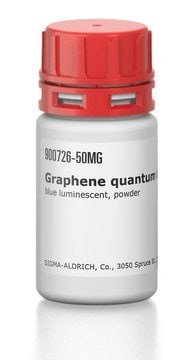915556
HNMB
≥98%
동의어(들):
4-[(E)-[(2-hydroxy-1-naphthalenyl)methylene]amino]-3-methyl benzoic acid, Aggregation-induced emmision (AIE) materials, Mechanochromic luminescent (MCL) materials
로그인조직 및 계약 가격 보기
모든 사진(2)
About This Item
실험식(Hill 표기법):
C19H15NO3
CAS Number:
Molecular Weight:
305.33
MDL number:
UNSPSC 코드:
12352103
NACRES:
NA.23
추천 제품
Quality Level
분석
≥98%
양식
solid
색상
white
mp
292.9 °C
UV 흡수
λ: 317 nm Amax
λ: 443 nm Amax
SMILES string
N(=C\c2c3c(ccc2O)cccc3)/c1c(cc(cc1)C(=O)O)C
InChI
1S/C19H15NO3/c1-12-10-14(19(22)23)6-8-17(12)20-11-16-15-5-3-2-4-13(15)7-9-18(16)21/h2-11,21H,1H3,(H,22,23)/b20-11+
InChI key
HCGGUBXKKWXERU-RGVLZGJSSA-N
애플리케이션
HNMB is a mechanochromic luminescent material with aggregation-induced emission (AIE). It has applications for pressure sensing and mapping.
In biology, pressure could direct the folding-unfolding of protein molecules, guide blood stream and even control the cell migration. The complexity with these cases makes the monitor and measurement of pressure from conventional force sensor based on classical mechanics impractical. Based on mechanical sensitive materials with ingenious design at the molecular level, a new way to detect pressure is developed. And mechanochromic luminescent (MCL) materials have formed a vital part of such materials. They are intentionally endowed with the ability to change luminescence property (e.g., emission wavelength, emission intensity and lifetime) under mechanical force, which can be readily detected by naked eyes or instruments. As molecule-based sensors, they are compatible to various flexible substrates and arbitrarily curvilinear surfaces, facilitating many applications.
In biology, pressure could direct the folding-unfolding of protein molecules, guide blood stream and even control the cell migration. The complexity with these cases makes the monitor and measurement of pressure from conventional force sensor based on classical mechanics impractical. Based on mechanical sensitive materials with ingenious design at the molecular level, a new way to detect pressure is developed. And mechanochromic luminescent (MCL) materials have formed a vital part of such materials. They are intentionally endowed with the ability to change luminescence property (e.g., emission wavelength, emission intensity and lifetime) under mechanical force, which can be readily detected by naked eyes or instruments. As molecule-based sensors, they are compatible to various flexible substrates and arbitrarily curvilinear surfaces, facilitating many applications.
Storage Class Code
11 - Combustible Solids
WGK
WGK 3
Flash Point (°F)
Not applicable
Flash Point (°C)
Not applicable
가장 최신 버전 중 하나를 선택하세요:
Xin Qian et al.
Advanced materials (Deerfield Beach, Fla.), 30(25), e1800291-e1800291 (2018-05-04)
Mechanically driven light generation is an exciting and under-exploited phenomenon with a variety of possible practical applications. However, the current driving mode of mechanoluminescence (ML) devices needs strong stimuli. Here, a flexible sensitive ML device via nanodopant elasticity modulus modification
Mengyao Zhang et al.
Spectrochimica acta. Part A, Molecular and biomolecular spectroscopy, 220, 117125-117125 (2019-05-29)
In this study, we report a new compound, (E)-4-(((2-hydroxynaphthalen-1-yl)methylene)amino)-3-methylbenzoic acid (HNMB), which shows aggregation-induced emission property as well as intramolecular charge transfer (ICT) nature. In addition, it exhibits unique mechanochromic luminescence (MCL). The HNMB solid powder emits strong emission but
Eethamukkala Ubba et al.
Chemistry, an Asian journal, 13(21), 3106-3121 (2018-08-10)
Mechanoluminescence (ML) involves the emission of light from various organic and inorganic materials upon mechanical stimulus. In this review, we contemplate the advances of metal-free, purely organic ML compounds with aggregation-induced emission (AIE), which give strong emission upon mechanical force.
자사의 과학자팀은 생명 과학, 재료 과학, 화학 합성, 크로마토그래피, 분석 및 기타 많은 영역을 포함한 모든 과학 분야에 경험이 있습니다..
고객지원팀으로 연락바랍니다.






